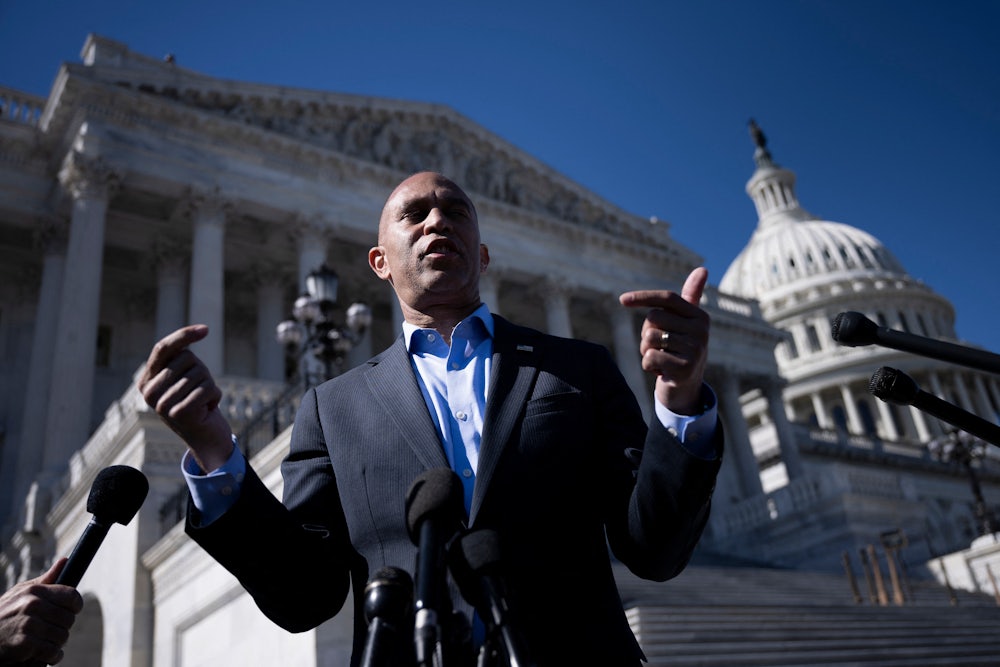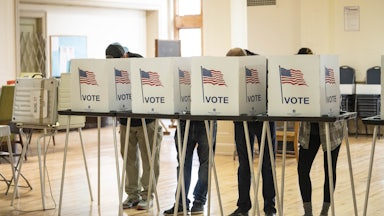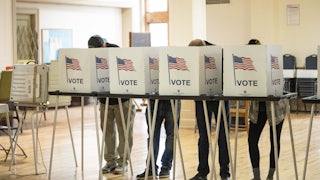One of the consequences of the 2024 presidential election is that the media and various political elites have become transfixed with the plight of young men, both economically and socially. Will young men find jobs in a frozen labor market? Are young men lonely, and what are the political implications of their isolation? What is to be done, and which podcasters need to be enlisted to fix it?
It’s not like these questions aren’t relevant. Yes, young men are suffering, emotionally and financially. We are living in a time of extreme economic inequality, one in which we are isolated from one another in a way that arguably empowers oligarchs. But it’s also true that a diverse array of demographic groups are struggling to pay the rent, secure a job, and find social support. The nuances of the economic challenges women face and the longer-term challenges men have experienced in the labor market are getting lost in some of the lopsided focus on young men.
Media and political leaders are very concerned about white men in particular holding onto their masculinity and status. The often unspoken consensus is that losses in their social standing indicate that the order of things is collapsing. When women, especially women of color, are struggling emotionally and financially, it is often treated as an unfortunate but inevitable part of how the system under capitalism works. In their analysis of how the economy has moved young men to the right, political pundits and leaders on the left shouldn’t forget that young women and mothers of all ages have also been unhappy with the state of affordability in this country.
Despite this heavy concern for men’s economic and political future, the economic data on their experience of the economy is mixed. It isn’t clear that men as a whole are doing a lot worse while women are “thriving,” as some coverage would suggest. Over the long term, people without a college degree, men in particular, have seen steeper falls in labor force participation, according to an Economic Policy Institute, or EPI, analysis, largely due to the decline in manufacturing and military jobs, mass incarceration, and a rise in opioid use. For Black men, the mass incarceration rates of the 1980s and 1990s, fueled by racist political rhetoric, hurt their labor force participation rates in particular.
But it’s also true that labor force participation for men in total has rebounded a bit during stronger economic times. Although the rate increased 0.3 percentage points per year for women and 0.1 percentage points per year for men, periods of high unemployment have been associated with declines in labor force participation for both men and women, the EPI report explained.
Elise Gould, senior economist at EPI, said policy makes a huge difference in how the fallout from economic crises affects different populations, and gave the Great Recession as an example.
“A lot of jobs were initially lost in areas like manufacturing and construction, so it was more men losing their jobs, but then you saw that when those jobs came back, it actually took much longer for the public-sector jobs to recover,” she said. “Austerity that was pursued in the aftermath of the Great Recession meant that then state and local governments didn’t have the funds they needed, and so a lot of those jobs, which were disproportionately women’s, didn’t come back in the same way.”
When you look at the pandemic recession, private-sector employment fell off and then experienced a bounce back. Public-sector employment, on the other hand, didn’t have as drastic a drop, but also took longer to recover, Gould said.
It’s also hard to ignore how the layoffs enacted by the Trump administration at various stages this year directly harmed women and minority groups when they disproportionately staffed these agencies. Mike Madowitz, the principal economist at the Roosevelt Institute, a left-leaning think tank, said that women’s employment-to-population ratios, the share of the working-age population that is employed, are down a bit this year while men’s employment ratios are up a bit this year in aggregate.
Economists said that overall, young people of all genders are struggling in today’s job market. Graduating into a poor labor market can have lifelong impacts on a person’s wages and retirement. “I can look at top-line numbers and say the economy seems to be mostly treading water. If you just finished a degree, this does not make you feel great about the world,” Madowitz said.
Still, some of the economic analysis of men’s labor-market struggles does not acknowledge the particular challenges women face throughout their lifetimes to remain economically stable. They still make less money than men, particularly when you compare Black, Native American, Native Hawaiian and Pacific Islander, and Hispanic women’s earnings to white, non-Hispanic men. The U.S. Census Bureau’s wage data from 2024, which was released in September, showed that the pay gap for women, which had been narrowing, has grown wider since 2023.
Economic research tells us that women often take longer to return to the labor force when they lose jobs during economic downturns, Madowitz said, especially when they have kids. Age discrimination at work also tends to hit women harder, he said. Harvard Business Review findings released in 2023 also showed that women experience age discrimination at every age, with younger women infantilized in the workplace and older women dismissed as irrelevant. Mothers often experience gender bias, challenges within heterosexual relationships, and structural challenges that make it harder for them to thrive in their careers after having kids—and the cost of childcare has outpaced inflation, making it harder for families to afford. A much larger percentage of women than men have said they have had to cut back hours or quit a job to make up for that cost, even though it impacts their lifetime earnings and overall economic stability.
“The long-term picture is definitely that men’s employment and labor force participation has been declining pretty steadily for the last 40 years and women were rising for a while but have basically been treading water since about 2000,” Madowitz said.
Although the month-to-month data on employment, for which we lack recent data due to the government shutdown, is often volatile, economists are concerned about the uptick in the unemployment rate for Black people in particular. In August, the unemployment rate for Black men over 20 reached 7.1 percent, and for Black women over 20, it climbed to 6.7 percent in August. Just a couple years ago, Black women’s unemployment hit a historic low of 4.2 percent. The unemployment rate for young Black people rose from 14.3 percent in July to 16.8 percent in August.
Experts on political behavior and men’s online spaces say that there is reason to believe economic issues influenced young men to move to the right. In particular, researchers of the neo-manosphere say young men may have been lured in by the idea that they can achieve a certain kind of life that is currently out of their grasp.
Megan Kelly, a co-founder of the Institute for Research on Male Supremacism, an organization focused on academia to “expose the dangers of male supremacist ideology and mobilization,” said people are looking for certainty in a time of economic and social change.
“People think these old scripts have broken down and are looking for a new set of ways to survive, and that there is a mythical path where things are OK and happy and great, and this call to return to gender roles is, in some cases, because of that,” she said. “There has been a questioning of the gender order we’ve had for a very long time, and people can either be expansive with and break binaries, or they often panic and try to go toward some right path they believe will lead them to prosperity and happiness.”
But if Trump fails to deliver a fruitful economy, there’s reason to believe there’s an opportunity for progressives to send young men their own message about financial stability.
“The economy played a huge role with young men as it did with young women and with voters in general,” said Marty Gilens, professor of public policy, political science, and social welfare at the UCLA Luskin School of Public Affairs. “But in particular, young people are going to be less tied to a political party. They have less history of politics and electoral outcomes to draw on.”
New information released from focus groups of young men who supported Trump, conducted over the summer by Third Way and HIT Strategies, revealed that those surveyed feel resentful and hopeless—and that the lack of affordability in everyday life is frustrating them. They also said that Trump’s tariff policies were not exactly going as planned and were making things more expensive.
Although Gilens said presidents in general may have modest impacts on the economy because of factors outside of their control, Trump is an exception. Given the heavy hand he’s placed on economic policy, it may be reasonable for voters to assume from what we have seen in the first few months of his administration that his policies have had a considerable economic effect.
“I think it actually makes sense to attribute a lot of the sort of economic conditions, good or bad, to what the president has done, and so yes, absolutely, if the economy is perceived as being bad, then Trump and Republicans are going to be blamed,” he said.
Political leaders and the media should be wary, however, of ignoring women or throwing women under the bus while conducting the important work of communicating better with young men on economic issues. Women have already suffered under the economy Trump has helped build and are likely to continue to see major setbacks to their economic mobility. They will be looking to Democrats to address it, and if they feel abandoned, it could derail the party’s goals, some political strategists say.
Celinda Lake, president of Lake Research Partners, a national public opinion and political strategy research firm, said that it’s clear from the data that young women who didn’t show up to vote weren’t happy with Democrats either, as Harris did not draw enough of a contrast with Biden as a candidate, and they were not convinced that the Democrats’ agenda was oriented toward them. Lake said that while Democrats have to improve their margins with young men, it’s young women that can “take us over the top,” as they are deeply unhappy with Trump’s political style and policies.
“We have problems with men and women, and we have to be dealing with both. Our biggest opportunity for the long term is with younger women. We need to particularly improve our numbers with non–college educated women and our turnout of young women,” Lake said.
A July report from Lake Research Partners showed that among people who skipped voting in 2024, on economic issues, the top two issues that most affected their decision not to vote for Harris were that she did not have a strong enough plan to get the cost of living down and that her economic plans mostly focused on the middle class and homeowners rather than poverty and inequality.
Affordability, health care, and caregiving are three big buckets, Lake said, that Democrats need to improve their messaging on to appeal to more women. She said Democrats lost credibility on caregiving when ambitious childcare proposals were dropped from Biden’s landmark legislation.
“That was a huge mistake,” said Lake. “The party is really divided on this. There are people who are saying just let the Republicans hang themselves, just let them do bad and stay out of the way. But that’s a profoundly flawed strategy when your own favorability is down to 35 percent, and when people can’t follow what your agenda is and think you have the wrong priorities.”










